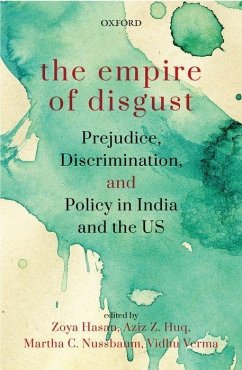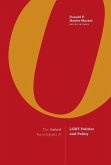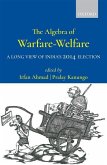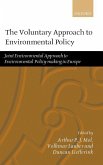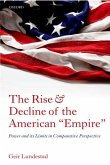The Empire of Disgust
Prejudice, Discrimination, and Policy in India and the Us
Herausgeber: Hasan, Zoya; Verma, Vidhu; Nussbaum, Martha C; Huq, Aziz Z
The Empire of Disgust
Prejudice, Discrimination, and Policy in India and the Us
Herausgeber: Hasan, Zoya; Verma, Vidhu; Nussbaum, Martha C; Huq, Aziz Z
- Gebundenes Buch
- Merkliste
- Auf die Merkliste
- Bewerten Bewerten
- Teilen
- Produkt teilen
- Produkterinnerung
- Produkterinnerung
All known societies exclude and stigmatize one or more minority groups, frequently employing a rhetoric of disgust to justify this stigmatization. In this volume, interdisciplinary scholars from India and the United States present a detailed and theoretically pluralistic study of the varieties of stigma that pervade contemporary social and political life. These include prejudice along the axes of caste, race, gender identity, age, sexual orientation, disability, religion, ethnicity, and economic class. Looking forward the authors present legal and policy-based remedies aimed at eliminating pervasive stigma in all of its diverse forms.…mehr
![The Politics of the Euro-Zone The Politics of the Euro-Zone]() Kenneth DysonThe Politics of the Euro-Zone79,99 €
Kenneth DysonThe Politics of the Euro-Zone79,99 €![Living the Policy Process Living the Policy Process]() Philip B HeymannLiving the Policy Process108,99 €
Philip B HeymannLiving the Policy Process108,99 €![The Oxford Encyclopedia of LGBT Politics and Policy The Oxford Encyclopedia of LGBT Politics and Policy]() Donald P Haider-MarkelThe Oxford Encyclopedia of LGBT Politics and Policy747,99 €
Donald P Haider-MarkelThe Oxford Encyclopedia of LGBT Politics and Policy747,99 €![Europe in the New Middle East Europe in the New Middle East]() Richard YoungsEurope in the New Middle East149,99 €
Richard YoungsEurope in the New Middle East149,99 €![The Algebra of Warfare-Welfare The Algebra of Warfare-Welfare]() The Algebra of Warfare-Welfare65,99 €
The Algebra of Warfare-Welfare65,99 €![The Voluntary Approach to Environmental Policy The Voluntary Approach to Environmental Policy]() Arthur P.J. Mol / Volkmar Lauber / Duncan Liefferink (eds.)The Voluntary Approach to Environmental Policy111,99 €
Arthur P.J. Mol / Volkmar Lauber / Duncan Liefferink (eds.)The Voluntary Approach to Environmental Policy111,99 €![The Rise and Decline of the American Empire The Rise and Decline of the American Empire]() Geir LundestadThe Rise and Decline of the American Empire86,99 €
Geir LundestadThe Rise and Decline of the American Empire86,99 €-
-
-
Hinweis: Dieser Artikel kann nur an eine deutsche Lieferadresse ausgeliefert werden.
- Produktdetails
- Verlag: Hurst & Co.
- Seitenzahl: 440
- Erscheinungstermin: 13. Dezember 2018
- Englisch
- Abmessung: 221mm x 147mm x 30mm
- Gewicht: 567g
- ISBN-13: 9780199487837
- ISBN-10: 0199487839
- Artikelnr.: 53773541
- Herstellerkennzeichnung
- Libri GmbH
- Europaallee 1
- 36244 Bad Hersfeld
- 06621 890
- Verlag: Hurst & Co.
- Seitenzahl: 440
- Erscheinungstermin: 13. Dezember 2018
- Englisch
- Abmessung: 221mm x 147mm x 30mm
- Gewicht: 567g
- ISBN-13: 9780199487837
- ISBN-10: 0199487839
- Artikelnr.: 53773541
- Herstellerkennzeichnung
- Libri GmbH
- Europaallee 1
- 36244 Bad Hersfeld
- 06621 890
Acknowledgements
Introduction
1. The Dalit Body: A Reading for the Anthropocene
Dipesh Chakrabarty
2. Stigma or Red Tape? Roadblocks in the Use of Affirmative Action
Ashwini Deshpande
3. Of Big Black Bucks and Golden-Haired Little Girls: How Fear of
Miscegenation Informed Brown v. Board of Education and Its Resistance
Justin Driver
4. Four Types of Racism
Emilio Comay del Junco
5. A Social Location Theory of Gender: How Gender Borders Create the
Category 'Woman'
Emily Dupree
6. Gender and Anti-Discrimination Laws in India: Modesty, Honour and
Defiled Bodies
Vidhu Verma
7. Regulating Retirement and Wrinkles in an Age of Prejudice
Saul Levmore
8. Aging, Stigma, and Disgust
Martha C. Nussbaum
9. Disgust or Equality? Sexual Orientation and Indian Law
Martha C. Nussbaum
10. The Rule of Disgust? Contemporary Transgender Rights Discourse in
India
Jeffrey A. Redding
11. Combatting Exclusions Through Law: Rights of Transgender People
in India
H.R.
* Vasujith Ram
12. Disability, Exclusions and Resistance: An Indian Context
Anita Ghai
13. Processes of Shaming: The Limits of Disability Policy in India
Nandini Ghosh
14. What is the Case Against Muslims?
Aziz Z. Huq
15. Muslims and the Politics of Discrimination in India
Zoya Hasan
16. Class and Classification: The Role of Disgust in Regulating
Social Status
Laura Weinrib
17. The Point of Discrimination Law: Securing the Freedom to Flourish
Tarunabh Khaitan
18. Economic Theories of Discrimination: The Positive and the
Normative
Richard H. McAdams
Author the editors and contributors
Index
Acknowledgements
Introduction
1. The Dalit Body: A Reading for the Anthropocene
Dipesh Chakrabarty
2. Stigma or Red Tape? Roadblocks in the Use of Affirmative Action
Ashwini Deshpande
3. Of Big Black Bucks and Golden-Haired Little Girls: How Fear of
Miscegenation Informed Brown v. Board of Education and Its Resistance
Justin Driver
4. Four Types of Racism
Emilio Comay del Junco
5. A Social Location Theory of Gender: How Gender Borders Create the
Category 'Woman'
Emily Dupree
6. Gender and Anti-Discrimination Laws in India: Modesty, Honour and
Defiled Bodies
Vidhu Verma
7. Regulating Retirement and Wrinkles in an Age of Prejudice
Saul Levmore
8. Aging, Stigma, and Disgust
Martha C. Nussbaum
9. Disgust or Equality? Sexual Orientation and Indian Law
Martha C. Nussbaum
10. The Rule of Disgust? Contemporary Transgender Rights Discourse in
India
Jeffrey A. Redding
11. Combatting Exclusions Through Law: Rights of Transgender People
in India
H.R.
* Vasujith Ram
12. Disability, Exclusions and Resistance: An Indian Context
Anita Ghai
13. Processes of Shaming: The Limits of Disability Policy in India
Nandini Ghosh
14. What is the Case Against Muslims?
Aziz Z. Huq
15. Muslims and the Politics of Discrimination in India
Zoya Hasan
16. Class and Classification: The Role of Disgust in Regulating
Social Status
Laura Weinrib
17. The Point of Discrimination Law: Securing the Freedom to Flourish
Tarunabh Khaitan
18. Economic Theories of Discrimination: The Positive and the
Normative
Richard H. McAdams
Author the editors and contributors
Index

